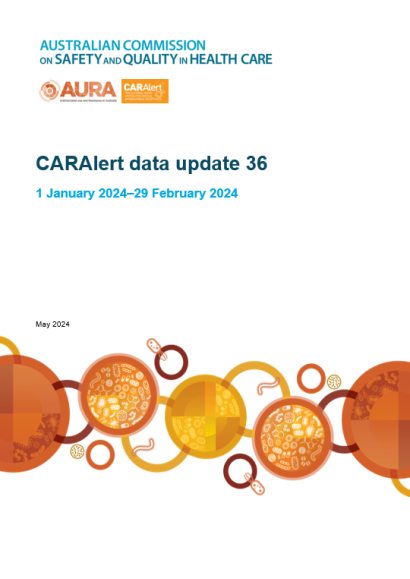National Alert System for Critical Antimicrobial Resistances (CARAlert)
CARAlert collects, analyses and reports on nationally agreed priority organisms with critical resistances to last-line antimicrobials.
Latest Annual Report
The 2023 CARAlert annual report was released in May 2024 and reveals the latest data on critical antimicrobial resistances (CARs) in Australia.
Overview
CARAlert was established by the Commission in 2016, and identifies seasonal and geographic trends in critical antimicrobial resistances (CARs) – these are critical resistance mechanisms or profiles that are uncommon in Australia and known to be a serious threat to the effectiveness of last-line antimicrobial agents.
Participating public and private laboratories across Australia voluntarily submit data on confirmed CARs to CARAlert. These data support infection prevention and control responses for potential outbreaks.
The CARs that are reported to CARAlert are outlined in the table below.
| Species | Critical resistance |
|---|---|
| Acinetobacter baumannii complex* | Carbapenemase-producing |
| Candida auris | |
| Enterobacterales | Carbapenemase-producing, and/or ribosomal methyltransferase-producing |
| Transmissible colistin resistance | |
| Enterococcus species | Linezolid-resistant |
| Mycobacterium tuberculosis | Multidrug-resistant – resistant to at least rifampicin and isoniazid |
| Neisseria gonorrhoeae | Ceftriaxone- and/or azithromycin-nonsusceptible |
| Gentamicin-resistant | |
| Neisseria meningitidis | Ciprofloxacin-nonsusceptible |
| Pseudomonas aeruginosa | Carbapenemase-producing |
| Salmonella species | Ceftriaxone-nonsusceptible |
| Shigella species | Multidrug-resistant |
| Staphylococcus aureus complex† | Vancomycin- or linezolid-nonsusceptible |
| Streptococcus pyogenes | Penicillin-reduced susceptibility |
* For CARAlert, A. baumannii complex includes A. baumannii, A. calcoaceticus, A. dijkshoorniae, A. nosocomialis, A. pittii and A. seifertii
† For CARAlert, S. aureus complex includes S. argenteus, S. aureus and S. schweitzeri













